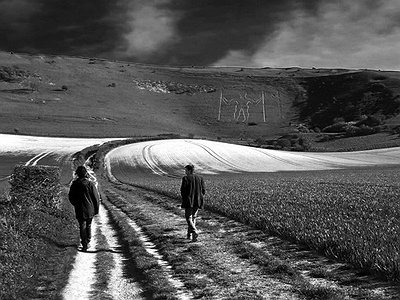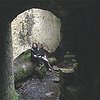Part 2
Could you describe your creative process on the basis of a piece or album that's particularly dear to you, please? Where do ideas come from, what do you start with and how do you go about shaping these ideas?
Not for a specific track as such, but we gained a great insight into the way we work as a duo at about 5.30 am on the morning of the Summer Solstice last year. We’d been up all night at Glastonbury Tor, and at Mike’s, and were standing in his garden as the dawn brightened up the sky. We both stood for a while listening silently, and when we finally spoke, we realised that while Mike was listening to the emerging dawn chorus, Mark was transfixed by the phasing sounds produced by distant traffic. That’s the Teleplasmiste sound in a nutshell!
With more and more musicians creating than ever and more and more of these creations being released, what does this mean for you as an artist in terms of originality?
MOP: Originality is very hard to come by. Almost every piece of music made within the past 50 years is connected in some way to something that preceded it. That’s just how culture works. It’s more important to have a recognisable sonic personality or footprint. I’d like to think that, while Teleplasmiste music can certainly be placed within existing modes or styles, it actually doesn’t really sound too much like anything out there, and that our sound has as an identity of its own.
MJY: I’m not sure I’m overly concerned with trying to be original. I try and create the sort of music that I would want to listen to. That said, if I try and copy something that I’ve heard and really like, it never comes out sounding anything like it anyway. It’d be nice to be thought of as original but not at the expense of making good music.
Who are some of the artists and communities that you find inspiring?
The wider family of people around Cyclobe, and by extension Coil, have been a great inspiration and influence, creatively, musically and personally, to us as Teleplasmiste. Mike and I actually met through our great mutual friends Cyclobe – Ossian Brown and Steve Thrower. Mike plays pipes with Cyclobe – and played them with Coil before that – and Mark has been friends with them for many years. Mike was playing in the bagpipe ensemble Zephyrus at the Hastings Jack in the Green festival on Mayday four years ago; we were both staying with Ossian and Steve and bonded over fart jokes, bats and megaliths.
How strictly do you separate improvising and composing?
MOP: There’s no difference for me. Any attempts to construct pieces in more traditional ways will always eventually lead to frustration, and then improvisation.
MJY: Improvising is a vital component of composing. I like to start a composition by improvising with as little self-censorship as possible; once you’ve captured these spontaneous “no strings attached” performances, you can start selecting the bits that lead in a particular direction that you find interesting and with any luck, the whole thing starts to snowball.
How do you see the relationship between sound, space and composition and what are some of your strategies and approaches of working with them?
We like to think of what we do as environmental engineering and often describe our tracks as places, with landscape features, even flora and fauna, of their own. So, in that sense, the connection between sound and space is very important.
People also often comment that our music doesn’t sound like it comes from an urban environment, which makes us happy. Mike lives in rural South West England and the bucolic character of his surroundings certainly informs a lot of what we do. Having said that, many people comment that the music doesn’t even come from a human environment, which is even better!
Regarding the practicalities of sound and space, our live performances often take place in unusual physical environments, or at least unusual for gigs: churches, crypts, galleries, a disused aeronautical wind tunnel, and, later this year, a nuclear bunker. We like to work as much as we can with the acoustics and character of those spaces, usually tailoring the performance to them in some way.
What's your perspective on the relationship between music and other forms of art – painting, video art and cinema, for example – and for you and your work, how does music relate to other senses than hearing alone?
As listeners with a preference for immersive, instrumental music, the experience is often accompanied by a visual element, whether it emerges through inner-world imagining, or just staring out of a window.
When we play live we are often accompanied by Pond Scum Light Show, who create mesmerising fluid patterns using natural dyes, gels, fluids, materials and objects, many of them taken from found ponds, projected over us with OHPs.
This really helps to give some sense of a visual, if abstract, narrative element to our live performances, which are often one single evolving piece lasting 40 minutes or more. It also helps to ameliorate the fact that watching two men of a certain age twiddling knobs and plugging and unplugging cables isn’t that captivating. We’ve also edited non-narrative films of our own for projection during live sets, for the same reasons.
What's your view on the role and function of music as well as the (e.g. political/social/creative) tasks of artists today - and how do you try to meet these goals in your work?
An important role for us is that music should be transportative. It should either carry you away to new spaces and environments, or open doorways into your current environment, letting new life in. We both have a strongly animistic outlook which colours our music, and our approach to the world – everything is alive, including our synthesisers, and by extension, our music.
Listening is also an active, rather than just a passive process. How do you see the role of the listener in the musical communication process?
Continuing the above response really. While it’s often quite melodic, our music requires a fair bit of work on the part of the listener. The more they listen, the deeper they will explore, and the more effective the music will be in taking them somewhere else, or bringing somewhere else to them.
Do you have a musical vision that you haven't been able to realise for technical or financial reasons – or an idea of what music itself could be beyond its current form?
MJY: I do but I’m not telling as I want it to be a surprise, so watch this space ;-)
MOP: Mine involves a big hole in the ground, and lots of smoke.






